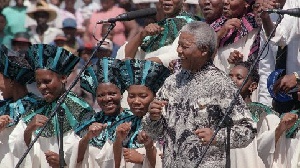During his lifetime, Nelson Mandela inspired many to embrace his vision of a better world, including a new generation of African political leaders.
Among those leaders is Ghanaian President John Dramani Mahama.
Mahama was only 5 years old when Mandela was banished to Robben Island to serve out the remainder of his prison term. But he, like many young Africans, grew up idolizing Mandela as a freedom fighter.
In the 1970s, Mahama joined the African Youth Command, which, as he says, "refused to let Mandela fade from memory" by organizing demonstrations around social and political causes, including protests against apartheid.
When Mandela was released from prison in 1990, Mahama was struck by the South African's insistence on forgiveness and reconciliation. Mahama went on to serve in his country's Parliament and as vice president, and then, in July 2012, he took office as president.
Mahama spoke with NPR's Tell Me More host Michel Martin about how Mandela was a different kind of role model and shared the lessons he will take from Mandela's leadership.
Interview Highlights
On Mandela's transformation after his release from prison
He was a much different man from the picture that had stuck in my mind. The picture that we had of him was a young man with bushy Afro hair with a part in it. The man who came out of prison was much older, dignified, but you could see his spirit was unbroken. And after going through so much indignity and such cruelty you would think somebody would come out with bitterness and rage but ... he asked everybody who lived in South Africa to share the opportunity that the country had to offer.
Mandela was a different kind of role model for young African activists
Our role models were willing to stand up and fight. And so we admired Che Guevara, we admired the Mau Mau fighters in Kenya, but other freedom fighters like Gandhi and Mandela cast the whole issue in a different light. These are people who used forgiveness and peace and calling on people to come together as a very powerful tool for achieving the same objectives.
On the three important things he learned from Mandela about leadership
"One, to persevere in whatever struggle one is involved in. Two, to learn to forgive. And then three, a lesson that I learned not only from Mandela but from my father, is to leave when the applause is the loudest.
General News of Saturday, 7 December 2013
Source: npr.org

















